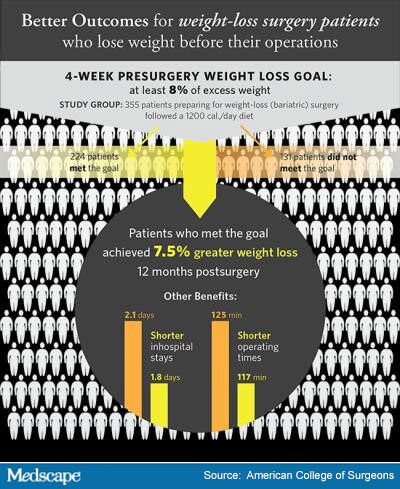Patients who lose at least 8% of their excess body weight 4 weeks before undergoing bariatric surgery achieve greater weight loss over the next 12 months than those who do not lose this amount of weight preoperatively. Hence, presurgery weight loss should be encouraged for maximal success, new research indicates.
“Our ultimate goal was to see what makes postoperative outcomes better for our patients undergoing this lifesaving procedure,” senior author John David Scott, MD, Associate Professor of Surgery, University of South Caroline School of Medicine, Greenville, said in a statement from his institution.
“[So while] the recommendation of 8% excess weight loss during a preoperative low calorie diet should be viewed by surgeons and patients as a goal or aspiration, rather than a requirement, achieving this goal may enable patients to reap stronger postoperative outcomes, including greater weight loss,” he and his coauthors say.
The study was published online February 2 in the Journal of the American College of Surgeons, by Deborah A Hutcheon, DCN, RD, LD, of the Division of Bariatric and Minimal Access Surgery, Greenville Health System, South Carolina, and colleagues.
Hutcheon, a clinical nutrition specialist, noted in the statement that there is a “window of opportunity” following bariatric surgery that lasts up to 18 months during which physical and metabolic changes occur that help promote weight loss.
“After that time point, patients will have to rely on diet, exercise, and lifestyle management to maintain that weight loss,” she said.
“We call it the honeymoon period of bariatric surgery,” Dr Scott elaborated.
Patients Lost Weight With Meal Replacement Plan
In the study, 167 patients underwent sleeve gastrectomy and 188 patients underwent Roux-en-Y gastric bypass.
Four weeks prior to surgery, patients were asked to lose at least 8% of their excess weight by following a diet that provided 1200 calories a day through an OPTIFAST 800 (Nestle Healthcare Nutrition) meal replacement plan.
Patients were also advised to drink at least 80 oz of calorie-free, caffeine-free, carbonation-free beverages a day and exercise for at least 30 minutes a day.
They were divided into those who were and were not able to achieve at least an 8% reduction in excess body weight during the preoperative period. Overall, 63.3% of the group met the prescribed weight loss goal while the remainder lost < 8% of excess body weight.
More men than women were in the group who lost ≥ 8% excess weight preoperatively, and more women and African American patients were in the group who did not achieve the preoperative weight loss goal.
Body mass index (BMI) at the time the diet was initiated was also higher, at 49.4 kg/m2 on average, among those who did not lose ≥ 8% excess body weight preoperatively compared with 46.3 kg/m2 for those who did (P < .001).
Three, 6, and 12 months after undergoing bariatric surgery, patients in the ≥ 8% preoperative excess weight loss group achieved a higher average percentage body weight loss than those who were less successful at losing weight preoperatively.
Average Percentage Body Weight Loss Following Bariatric Surgery
| Time after bariatric surgery | ≥ 8% excess weight loss preop | < 8% excess weight loss preop | P value |
|---|---|---|---|
| 3 months, %* | 42.3 | 36.1 | < .001 |
| 6 months, %* | 56.0 | 47.5 | < .001 |
| 1 year, %* | 65.1 | 55.7 | .003 |
*Average percentage body weight loss.
Length of postoperative hospital stay was also shorter at 1.8 days for those who achieved ≥ 8% or greater weight loss prior to surgery vs 2.1 days for those who did not (P = .006), as was average operative time (117 vs 125 minutes, respectively).

Window of Opportunity Is a Year, or 18 Months at Most
Talking about the window of opportunity after surgery, Dr Scott said: “After a year, or a year and a half, your body starts to figure out what it can and can’t do, and your behaviors may change a little bit, so the odds that you are going to lose a significant amount of weight after that time are definitely decreased.”
So the more weight you can lose during that honeymoon period the better, because that effort will help establish a set point in terms of where your steady weight is going to be further down the road,” he observed.
On the other hand, the authors emphasize that losing 8% of excess weight preoperatively must not be an eligibility requirement for bariatric surgery.
“It is clear that patients unable to meet this goal can still lose weight postoperatively and experience resolution of comorbidities,” they stress, as supported by the 55% excess weight loss the group achieved 12 months after surgery, despite not achieving the preoperative weight loss goal.
“Therefore, it is our steadfast belief that fitness and preparation for bariatric surgery are best determined by bariatric surgeons and their integrated programs,” they observe.
It is noteworthy that some insurance policies mandate that patients being considered for weight loss surgery participate in a 6- or 12-month weight management program before they become bariatric surgery candidates.
This is contrary to what many bariatric surgeons prefer, which is to recommend patients follow a low calorie diet a few weeks prior to the procedure to optimize outcomes.
The authors have reported no relevant financial relationships.
J Am Coll Surg. Published online February 2, 2018. Abstract
For more diabetes and endocrinology news, follow us on Twitter and on Facebook.
Tidak ada komentar:
Posting Komentar